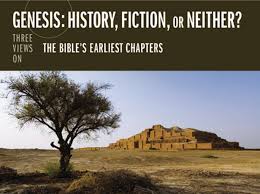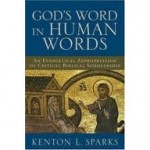 Zondervan’s latest volume in their popular “Counterpoints” series concerns the historicity of Genesis 1-11, Genesis: History, Fiction, or Neither?: Three Views on the Bible’s Earliest Chapters. The three well-known contributors are James Hoffmeier (Trinity International University), Kent Sparks (Eastern University), and Gordan Wenham (Trinity College and University of Gloucestershire).
Zondervan’s latest volume in their popular “Counterpoints” series concerns the historicity of Genesis 1-11, Genesis: History, Fiction, or Neither?: Three Views on the Bible’s Earliest Chapters. The three well-known contributors are James Hoffmeier (Trinity International University), Kent Sparks (Eastern University), and Gordan Wenham (Trinity College and University of Gloucestershire).
The editor, Charles Halton, summarizes the differences between them:
Professor Hoffmeier believes that theology begins from the foundational understanding that the events recorded in Gen 1-11 really happened and that the Israelite scribes did not borrow from the Mesopotamian or Egyptian myths but were writing in opposition to them. The Israelites corrected the misunderstandings and mythologies of their day with an authoritative and historically accurate portrait.
Professor Wenham believes that there is a core of historical reality in Gen 1-11 but that the telling we have is like an impressionist painting–we can only make out vague outlines of what really took place.
Professor Sparks thinks that the writers of the Bible employed standard forms of ancient historiography whose primary intent was not to precisely relay events that occurred in space and time. These scribes emplotted a theological story that reveals deep insights into the character and nature of God. (pp. 155-56, my emphasis and formatting)
I’m familiar with the unavoidable limitations of the “Counterpoints” format (I’ve worked on two of the volumes, here and here
). Not every question can be addressed, nor is this the place for authors to say everything they want to say about their topic.
Nevertheless, I had the modest hope for this volume that James Hoffmeier–the pre-eminant evangelical scholarly defender of the historicity of the exodus–would put evangelicalism’s best foot forward, move beyond familiar apologetic rhetoric, and offer readers a best case for why the historical and comparative evidence point clearly toward Genesis 1-11 as history.
Instead, more often than not, I found Hoffmeier rehearsing frustratingly predictable apologetic tactics that are typically deployed whenever the historicity of a biblical episode is considered “under attack,” (tactics that Kent Sparks patiently laid out in his 2008 book God’s Word in Human Words: An Evangelical Appropriation of Critical Biblical Scholarship).
Hoffmeier’s “here I stand” rhetoric is clear in his introductory section, which I reproduce below (pp. 23-24, my emphasis):
Genesis 1-1 begins the story of redemption–the loss of God’s presence, intimacy between God and humans, and access to the tree of life. The narrative commences with “Paradise Lost,” and culminates in the New Testament with “Paradise Regained,” to borrow from one of John Milton’s seventeenth-century classic poems. Because of this overarching theme connecting the early chapters of Genesis to the book of Revelation, Genesis 1-11 must be taken seriously. In recent centuries, especially because of the influence of Enlightenment rationalism on scriptural interpretation, readers of the Bible wonder whether Genesis can be read as it once was in pre-critical times. The dominant scientific worldview has understandably influenced the way Christians read the Bible in general and Genesis 1-11 in particular. A consequence of this hermeneutic has prompted the preoccupation of European biblical scholars to employ “scientific” (Wissenschaftlich) approach that has sought to isolate the sources that stood behind Genesis, thereby denying the Jewish-Christian tradition of Mosaic authorship of the Pentateuch.
The short essay cannot devote time to the history of speculation about sources and origins of the book of Genesis, the so-called “critical” study of the Pentateuch. Consider, however, that the four-source hypothesis of Wellhausen that dominated biblical schoalrship from the mid-nineteenth to the end of the twentieth century has been in “sharp decline,” as E. W. Nicholson has observed and he admits “some would say [it is] in a state of advanced rigor mortis.” Consequently, the “assured results” of critical scholarship are being rejected, ironically enough, by European Old Testament scholars!
This rhetoric of “faithful to the Bible” vs. “critical scholarship” is disappointing and sets the tone for Hoffmeier’s essay and his responses, particularly to Sparks.
Let me summarize and interpret Hoffmeier’s concerns by rephrasing his comments.
1. Genesis 1-11 sets the theological stage for the rest of the Bible, and so, if Genesis 1-11 cannot be trusted to deliver to us historical truth, the entire theological structure of the Bible falls apart. Hence, the historical nature of Genesis 1-11 must be protected at all costs.
2. Denial of the historical nature of Genesis 1-11 is simply the product of atheistic thinking–of Enlightenment rationalism, which is fundamentally in rebellion against God. Hence, biblical criticism is only “so-called ‘critical'” because it is rooted in the deep bias of anti-biblical thinking.
3. Perhaps the most damaging aspect of Enlightenment thinking is the bewilderingly speculative preoccupation to distill sources behind Genesis. Since Wellhausen’s four-source theory (JEDP) has been rejected by even European scholars–and as such is DOA–we evangelicals who reject (and have always rejected) source criticism are not only vindicated but are actually show ourselves to be more rigorously academic than those who blindly hold to older critical “orthodoxies.”
4. Further, continuing to give quarter to the particularly odious, speculative theory of sources pits one against the entire Jewish and Christian pre-critical tradition that has accepted Moses as the fundamental author of the Pentateuch.
These opening paragraphs do not bode well for encouraging academic discourse. Hoffmeier revisits these themes in his essay and in his response to Sparks. To the 4 listed above, let me add 3 others that surface.
5. Since Genesis 1-11 refers to people with lineages and real geographic locations, it is clearly intended to be read as relaying historical space/time events, and so we must take this historical intention “seriously”–which means accept that this historical intention produced a historically accurate text.
6. Sparks puts science over the Bible, and which inexorably leads to a denial of the resurrection of Christ, which is also impossible on scientific grounds.
7. Genesis 1-11 cannot be influenced by Mesopotamian myth because it is a polemic against Mesopotamian myth.
Sparks addresses these 7 points and other concerns in his 10-page response, and regardless of where one’s sympathies lie, interested readers should avail themselves of both.
My own brief responses are as follows.
1. I agree that there is a theological “structure,” so to speak, for the Christian Bible, and that structure reflects the theological sensitivities of the biblical writers and of those who directed the process of canonization (first OT then NT). But the presence of this theological structure does not settle the vexing historical problems of Genesis 1-11, and to think that it does is a common evangelical and fundamentalist assertion.
Theological needs–better, perceived theological needs–does not determine historical truth. Evangelicals do not tolerate such self-referential logic from defenders of other faiths, and they should not tolerate it in themselves.
2. Claiming alleged Enlightenment influence on opponents is a well known conversation stopper among evangelical apologists, and I am particularly disappointed to see Hoffmeier resort to it. Evangelical defenses of historicity are often quickly propelled into the philosophical stratosphere of “presuppositions,” which has the unfortunate effect of reducing debates on concrete matters to claims of theological superiority.
As far as I am concerned, “you’re just beholden to Enlightenment rationalism” is on the same rhetorical level as “that sounds like Hitler (or Bultmann, or Barth),” or more economically, “you’re liberal.”
This sort of rhetoric is not designed to converse but to gain a theological upper hand by determining the playing field and rules of engagement. It has worn out its welcome and has no place in scholarly engagement.
3. Another common evangelical tactic repeated here by Hoffmeier is to equate Wellhausen’s 19th c. theory of Pentateuchal composition with source theories that have developed since Wellhausen. Sparks effectively addresses this in his response.
Let me simply say that source criticism is most certainly not dead, though most all have moved beyond Wellhausen, including neo-documentarians like Joel Baden and Jeffrey Stackert. (On this see Dozeman, Schmid, and Schwartz, The Pentateuch: International Perspectives on Current Research, 2011; especially Schwartz’s essay, “Does Recent Scholarship’s Critique of the Documentary Hypothesis Constitute Grounds for Its Rejection?)
And one would be hard-pressed indeed to find any biblical scholar outside of the inerrantist camp–whether Israeli, American, or European–who does not see the Pentateuch as having a rich and complex developmental pre-history spanning several hundred years and not coming to end until long after the return from exile.
P and D are not seriously questioned among biblical scholars. The origins of Israel’s ancient narratives– J and E–are. That is a great discussion to have. But the “we know Wellhausen was wrong so now we can retreat back to Mosaic authorship” rhetoric is at best misleading because it is grounded in a description of Pentateuchal scholarship that is absolutely wrong.
4. Following on #3, Hoffmeier seems to think that debunking Wellhausen not only neuters any source analysis of the Pentateuch but de facto puts Mosaic authorship back in its rightful place as the traditional, and problem-free explanation for Pentateuchal origins.
But Mosaic authorship, regardless of how the matter is framed, cannot be given a free pass. Its problems, which have been observed since long before the advent of “Enlightenment rationalism,” do not simply disappear.
Pre-critical misgivings about Mosaic authorship (albeit few and far-between) are not unknown (e.g., of Abraham Ibn-Ezra, 12th c. rabbi). Ironically, none other than conservative Calvinist E. J. Young lists in his Introduction to the Old Testament a long history of questions raised concerning Mosaic authorship stemming back at least to Jerome in the 4th c. (who queried whether Moses could have written the account of his own death in Deuteronomy 34 or whether perhaps Ezra is repsonsible).
Questioning Mosaic authorship is not recent invention. Where the modern period differs is in moving from canonical observation to historical explanation.
One should also note that source analyses do not necessarily stem from anti-religious bias. Jean Astruc (d. 1766) was the first to argue for different sources in Genesis based on the use on the divine name (Yahweh and Elohim, which become J and E, respectively), and did so in an effort to protect Mosaic authorship (by arguing that Moses was working with ancient sources).
Similar to response #1 above, disagreement with tradition does not make such disagreement wrong. “Who are you to go against tradition?” can be a valid question at times, but more often than not is a bullying tactic aimed at closing off discussion. Tradition can be wrong, as it was with a geocentric cosmos and “the Jews killed Jesus.”
5. Sparks addresses this point, when he states what appears to me to be obvious: intending to write history doesn’t mean you pulled it off, and biblical authors do not get a free pass on “historical accuracy,” especially without addressing the type of history writing we can expect from ancient Israelite/Jewish authors.
Addressing this key issue is what Sparks’s essay is all about. Hoffmeier, however, seems content to assume ancient and modern standards largely overlap.
Ancient genealogies and narratives set in real locations do not a historical narrative make, despite Hoffmeier’s strong contention to the contrary.
6. This same slippery-slope line recurs again and again and again and again whenever it is suggested that science or other scholarly disciplines affect how we think of the Bible (especially in the evolution debate), but this rhetoric is useless for reasoned and scholarly discussion.
I can say with full confidence that Sparks has not made some thoughtless presuppositional commitment to “Wissenschaft über alles (i.e. science triumphs over all!!), as Hoffmeier rather indelicately caricatures him (p. 142). To say that the study of human history–including ANE religious texts–renders suspect the historicity of Gen 1-11 is not to say that science triumphs over ALL but that science informs our thinking on issues that are actually open to scientific investigation.
Cosmic and human origins leave footprints that can be studied through scientific means (and is why Hoffmeier, I presume, does not think the world is 6000 years old). The resurrection of Christ doesn’t provide such footprints and therefore is not open to the same type of scientific investigation.
Of course, many do believe that science is the ultimate determiner of truth and so things outside of scientific investigation cannot have happened, but that is not at all where Sparks is coming from and to attempt to discredit Sparks by painting him as a science worshipper is somewhere between a gross misunderstanding and a low blow.
Allowing–even embracing–science to inform our reading of an Iron Age text does not mean one will also have to deny the resurrection. This line of defense needs to be put to rest.
7. I find it incredible that Hoffmeier contends that Genesis 1-11 is essentially independent of Mesopotamian origins stories. This is like suggesting that Roman theology and politics can be best understood apart from preceding Greek culture.
A key element in Hoffmeier’s argument is that Gensiss 1-11 is a polemic against Mesopotamian myth and therefore independent of it. But the fact that Genesis 1-11 is certainly polemical does not in any way suggest that far older Mesopotamian myth does not form the cultural back drop for Genesis 1-11. The polemic only works because it embraces ancient assumptions about the nature of the cosmos.
Genesis 1-11 cannot be isolated from its environment like this. To suggest that Genesis 1-11 alone escapes the many-layered interpenetration of ancient origins stories we find throughout the ANE is an essential rejection of any value for comparative study of the Bible.
To sum up, despite whatever positive evidence Hoffmeier feels he has adduced in his essay for the historicity of Gen 1-11, those points are only convincing if one is willing to:
- assert that theological need is the unimpeachable grounding for reading Genesis as history,
- characterize alternate view points as beholden to the philosophical biases of “Enlightenment rationalism,” and consequently
- keep at arm’s length two fundamental (and outside of inerrantist camps, universally accepted) elements of modern scholarship on Genesis: that Genesis (1) has a lengthy, complex pre-history that continues into the postexilic period, and (2) reflects far older Mesopotamian (and Canaanite and Egyptian) influence.
Let me stress this third point. We all know that historical criticism has its problems and excessive confidence in its alleged objectivity is to be roundly criticized–as it has been for generations. But the two elements of critical scholarship Hoffmeier rejects are not excessive or trendy but the very intellectual structure of the historical/academic study of the Pentateuch.
Hoffmeier is free to dismiss them, but let the be no mistake of the degree of distance Hoffmeier is willing to put between himself and basic, even elementary, conclusions of generations of modern scholarship on Genesis and the Pentateuch in order to maintain his position.
Hoffmeier is well within his right to make assertions and defend them. But as I said at the outset, I was hoping for something more than this. I’ve read much of what Hoffmeier has written. He is an educated man and capable of much more. But we don’t find it here.
If this type of rhetorical defense is the best that evangelical academia can muster to defend its theology, evangelicalism may have little left to contribute to the discussion.
















